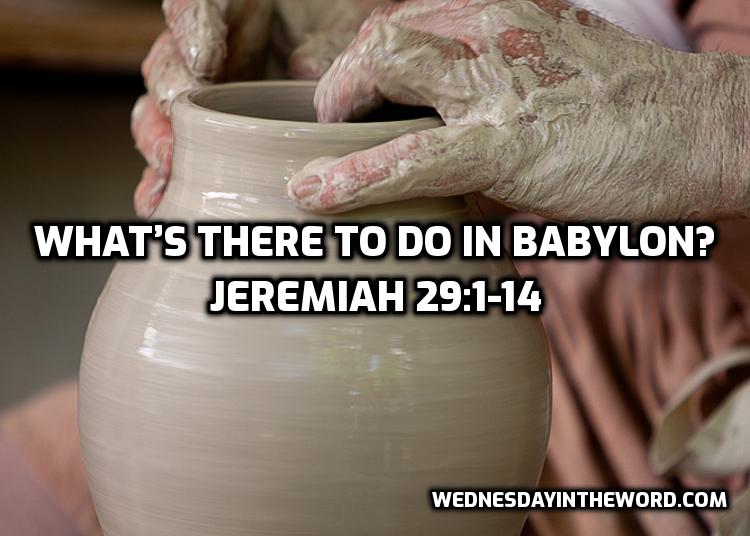Historical Context
Jeremiah began his ministry as the dominant world power, the Assyrians, descended into civil war. As the Assyrians began to lose their power, Babylon and Egypt sought to occupy the power vacuum that the Assyrians would leave. In the midst of this political turmoil the Lord calls Jeremiah. His job is to predict and warn of the coming Babylonian invasion and the restoration that would follow the exile.
1Now these are the words of the letter which Jeremiah the prophet sent from Jerusalem to the rest of the elders of the exile, the priests, the prophets and all the people whom Nebuchadnezzar had taken into exile from Jerusalem to Babylon. 2(This was after King Jeconiah and the queen mother, the court officials, the princes of Judah and Jerusalem, the craftsmen and the smiths had departed from Jerusalem.) 3The letter was sent by the hand of Elasah the son of Shaphan, and Gemariah the son of Hilkiah, whom Zedekiah king of Judah sent to Babylon to Nebuchadnezzar king of Babylon, saying, 4″Thus says the LORD of hosts, the God of Israel, to all the exiles whom I have sent into exile from Jerusalem to Babylon, – Jeremiah 29:1-4
- The exile happened in three different deportations (see Chronology).
- The first deportation occurred about 605 BC after the Battle of Carchemish when Nebuchadnezzar defeated the combined forces of Assyria and Egypt. The prophet Daniel was in that group of exiles (Jeremiah 46:2; Daniel 1:1-7).
- The second deportation occurred about 598BC when Babylon invaded Jerusalem and took the prophet Ezekiel and about 10,o00 into exile (2 Kings 24:12-17; 2 Chronicles 36:6).
- The third and final deportation occurs in 588 BC when the Babylonian army leveled the entire city of Jerusalem (Jeremiah 39:1-18).
- This letter is written to the people living in Babylon after the first and second deportation but before the destruction of Jerusalem. They want to escape the exile and return home.
Seek to endure, not escape
5’Build houses and live in them; and plant gardens and eat their produce. 6’Take wives and become the fathers of sons and daughters, and take wives for your sons and give your daughters to husbands, that they may bear sons and daughters; and multiply there and do not decrease. 7’Seek the welfare of the city where I have sent you into exile, and pray to the LORD on its behalf; for in its welfare you will have welfare.’ 8″For thus says the LORD of hosts, the God of Israel, ‘Do not let your prophets who are in your midst and your diviners deceive you, and do not listen to the dreams which they dream. 9’For they prophesy falsely to you in My name; I have not sent them,’ declares the LORD. – Jeremiah 29:5-9
- Jeremiah tells them to endure the exile, not escape it.
- Essentially Jeremiah tells them to stop putting their lives on hold, accept the new normal and live out their calling.
- But his message is more than just endure a hard situation.
Hope in the promise
10″For thus says the LORD, ‘When seventy years have been completed for Babylon, I will visit you and fulfill My good word to you, to bring you back to this place. 11’For I know the plans that I have for you,’ declares the LORD, ‘plans for welfare and not for calamity to give you a future and a hope. 12’Then you will call upon Me and come and pray to Me, and I will listen to you. 13’You will seek Me and find Me when you search for Me with all your heart. 14’I will be found by you,’ declares the LORD, ‘and I will restore your fortunes and will gather you from all the nations and from all the places where I have driven you,’ declares the LORD, ‘and I will bring you back to the place from where I sent you into exile.’ – Jeremiah 29:10-14
- Jeremiah 29:11 occurs in the context of enduring a long, hard exile.
- The Lord promises restoration and redemption but He takes his people through suffering, not around it.
Application
- 1) Realize we too our in exile. As believers, this world is not our home (see also 1 Peter 1:1-13)
- 2) Settle in and endure the exile, seeking the Lord and fulfilling our calling
- 3) Trust and hope in the promises of God that He has plans to prosper you and bring you home.
For more detail and explanation, please listen to the podcast.
Next: 12 Jeremiah 31:31-34 What good is faith?
Previous: 10 Jeremiah 23:9-33 Who should we listen to?
Series: Questions Jeremiah Answered
Resources: Jeremiah Resources
Scripture quotes are from the New American Standard Version of the Bible.
Photo used here under Flickr Creative Commons.

